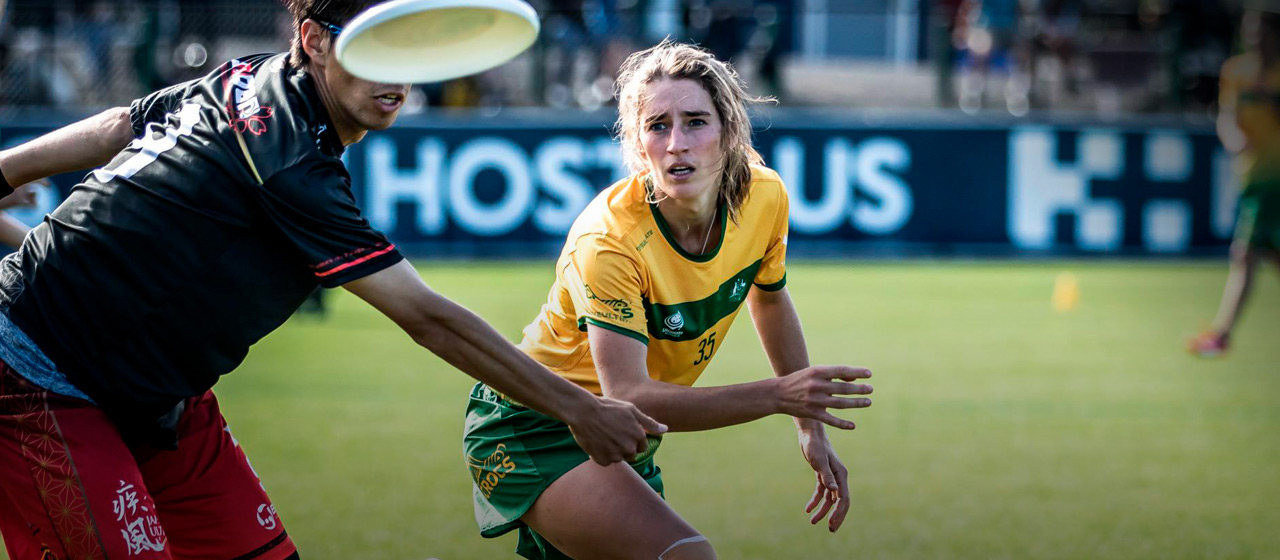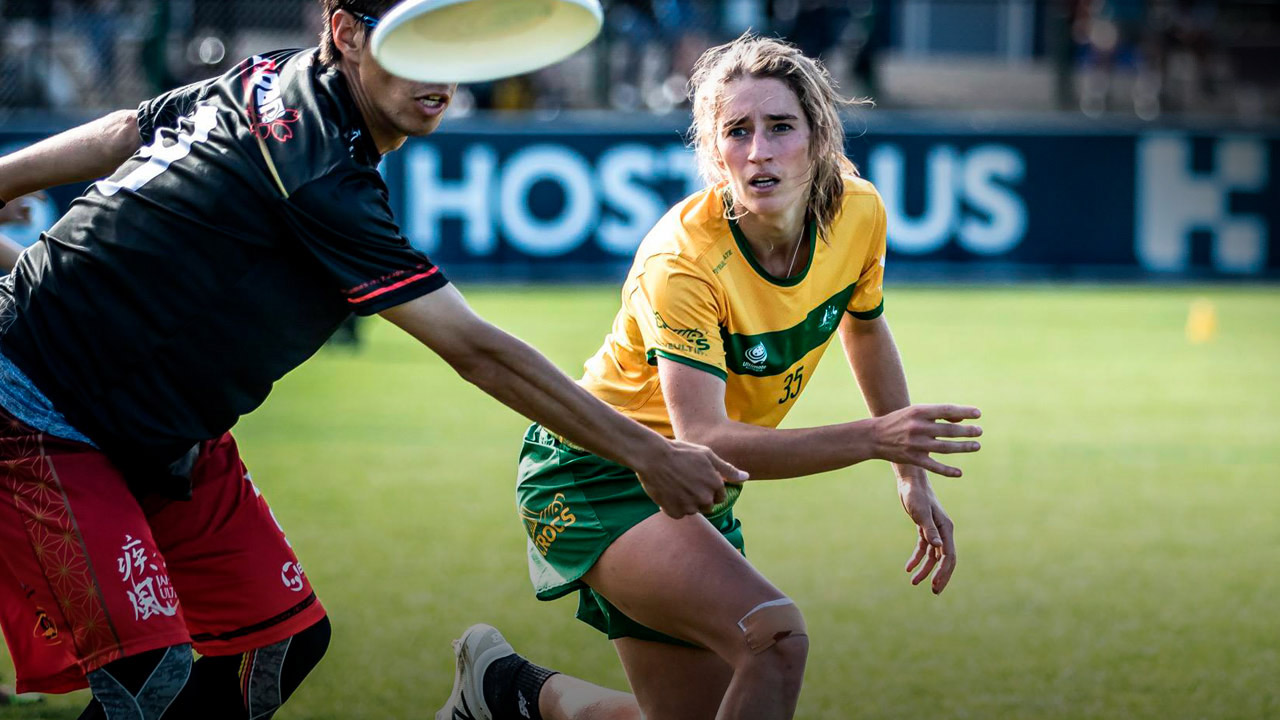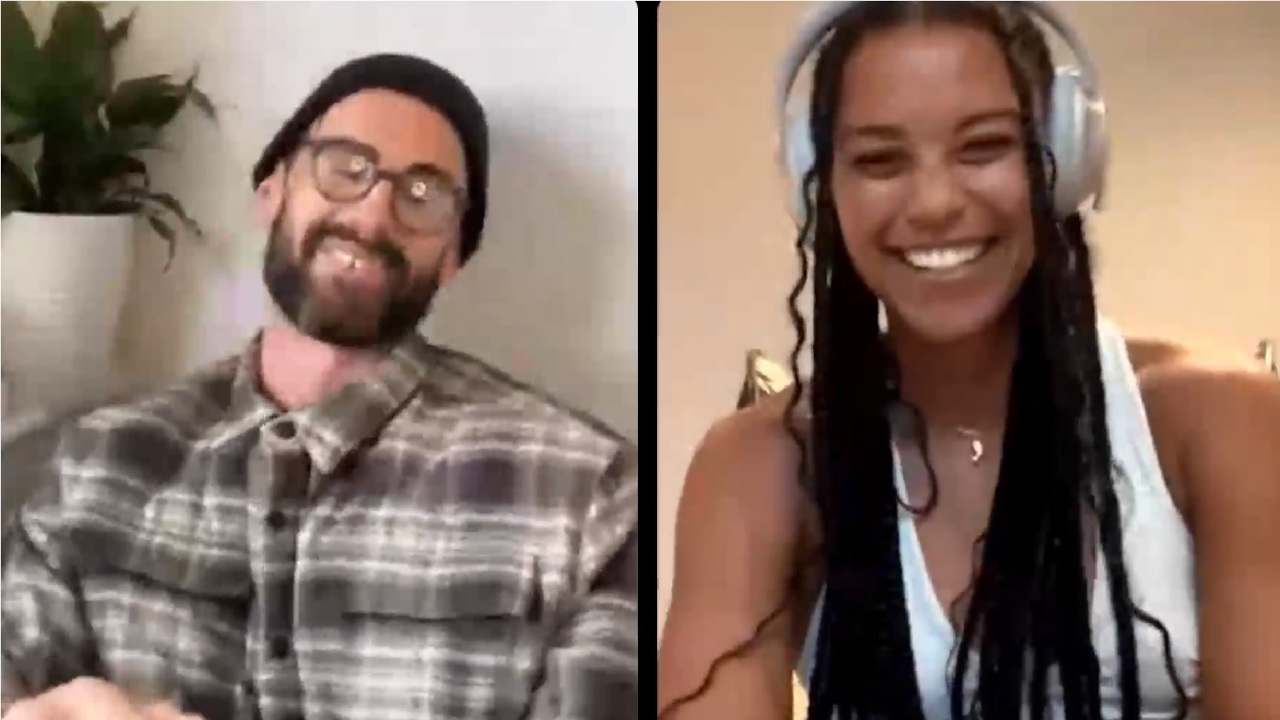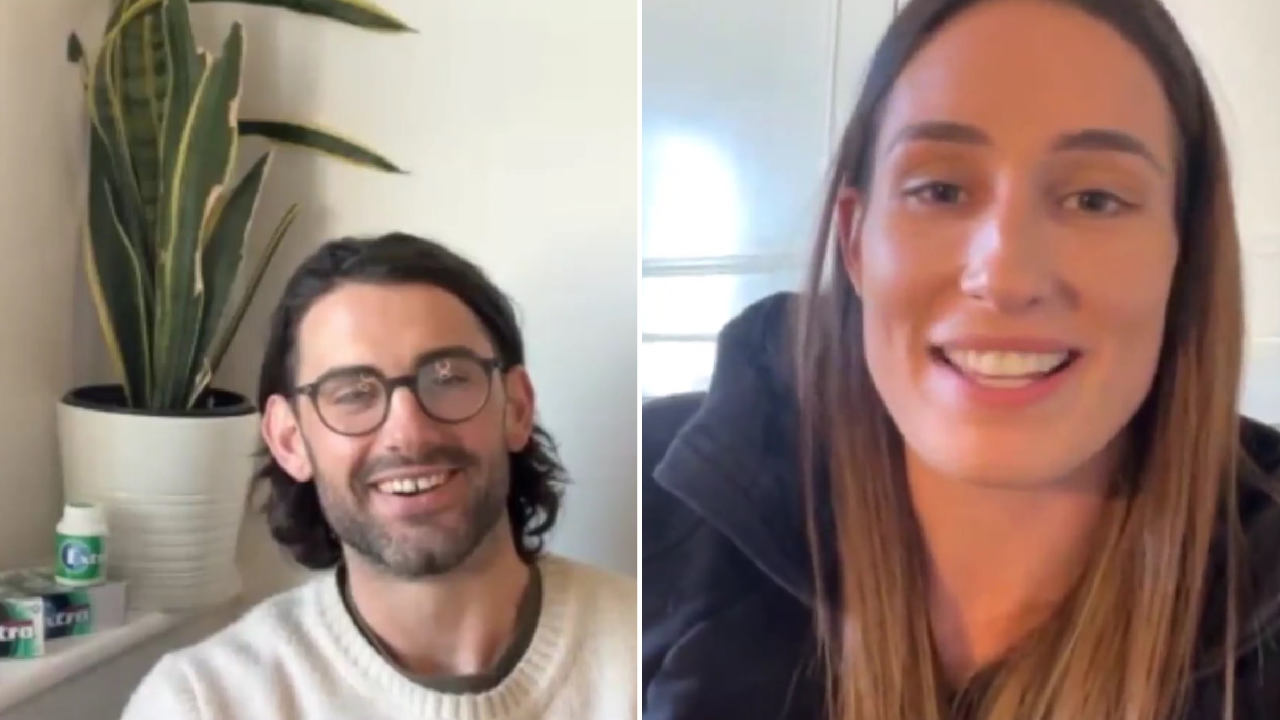AFLW
Ultimate act of sportsmanship
I’m a trained mechanical engineer, I play footy for the Melbourne Demons and I throw frisbees at an international level in the game of Ultimate Frisbee, or ‘Ultimate’ for short. This week, it’s all about the frisbee.
I got into Ultimate in Year 11, through my sister who played at uni. When I was about 16, I turned up one weeknight at an open training session run by the Melbourne Uni team, for anyone who wanted to come along.
Going through high school, I played netball and did a bunch of sports like athletics and swimming and water polo – kind of anything that I could. But I’d never played Ultimate before and had never ever thrown a frisbee for fun.
The first time I picked up a frisbee that night, I was pretty ordinary.
But I stuck with it and then a lot of the friends that I met through Ultimate were there when I got to uni. I continued to play all the way through and helped to develop the Melbourne Uni Ultimate Club, and then have kept going from there.
I’m 26 now and I love throwing a frisbee. Coming from a background where I’ve done a lot of maths and physics and engineering – things where you learn about how things work – I love the thinking that goes into throwing a frisbee. When you’re throwing, you have to take into account the wind and the weather and how fast you’re throwing and the angle that you throw it on.
There are a whole lot of aspects that you don’t see in many ball sports – although in footy, the random shape of the ball makes things interesting, too.
When you’re throwing the frisbee, you use a combination of forehand throws and backhand throws so you can throw around people who are defending you. You can also throw an overhead to go over or around people.
If you watch the top throwers in the world, it’s completely unbelievable the way they can throw it anywhere they want on the field at any time, making the most of the wind. They can even curve it one way, then back the other way – like a half figure-of-eight. It’s pretty cool to watch the really elite players.
And this week, I’ll be playing alongside many of the world’s elite players at the World Ultimate Club Championships in Cincinnati, Ohio, USA.

COULDN’T THROW, COULDN’T KICK
I’ve already told you that I couldn’t throw a frisbee when I first tried Ultimate. Well, I could barely kick a footy when I first tried AFL either.
I didn’t plan for this to happen. I grew up going to watch the footy with my uncle and my family, and we’d do a bit of kicking at halftime but that was pretty casual.
But when the AFL ran the talent combine days in 2016 ahead of the first AFLW season in 2017, a bunch of girls from my frisbee team thought we’d go along to the combine instead of Ultimate training one day.
Most of the girls just wanted to go for fun and I mostly wanted to go to test myself athletically against the other girls that would be there.
I didn’t know how I would compare with girls from netball or basketball, or wherever they came from, but I thought it would be fun to give it a go and compare myself. I’m quite competitive, so I wanted to have a benchmark.
After that day, I got invited to go to a try-out run by Melbourne Football Club. It was a similar draft combine type thing where they did a bit more kicking and a bit more footy-related work. I had a lot of fun at the first one and really enjoyed learning something new and trying to pick up new skills that I didn’t have.
Then Melbourne contacted me and said they’d offer me a spot on their team as a rookie if I wanted it. I thought it would be a great thing to give it a go.
A bunch of girls from my frisbee team thought we’d go along to the AFLW combine instead of Ultimate training one day.
The first season went really well. I learned a lot and had a lot of fun. I think Melbourne were fantastic with all of the players they had picked who were new to footy, as well as the up-and-coming girls. They were very good at developing people and helping everyone to get the best out of themselves for that year – and we were unlucky not to make the Grand Final, winning five of seven games and missing out on percentages.
Last season was also a season of improvement for me personally. I find it so exciting to take someone on out on the wing, then run past them, because I feel like that’s what my strength is and what I’m really working on turning into a weapon.
For me, what’s really exciting on the field is putting into practice the fundamentals that I’ve been working so hard on off the field. If I can kick goals, that’s obviously an added bonus but for me, the other parts of my game are more rewarding at the moment.
I supported Collingwood growing up. We went to nearly every game. They say you can’t change your team but I couldn’t believe how quickly I moved on once I got involved with Melbourne. It’s very hard to retain your old loyalties once you start to know the people and get involved with the program at the club you play for.
The first year when Melbourne and Collingwood played in the men’s AFL, I didn’t know who I’d be going for. But I was pretty keen for Melbourne to win, so I knew right then that I’d moved on.

THE ULTIMATE SKILL BASE
One sport is all about throwing, the other all about kicking and handballing. But has my Ultimate skillset helped me become a footy player?
I think Ultimate has definitely helped me be able to read the play quite well in footy. Understanding where effective or dangerous space on the field is and where to run, and the timing of when to hold and when to go – these skills have all transferred across pretty well for me.
Playing on the wing in footy, I’m pretty quick to make up my mind about whether to come in and help, or to spread out and make space for people. The running patterns are pretty similar in Ultimate and of course, my running capacity is extremely valuable in footy.
Ultimate is very physical. There’s a lot of running required, which means I’ve come into footy with a good fitness background and a good balance between short, sharp intense running and then longer endurance stuff as well.
Ultimate has definitely helped me be able to read the play quite well in footy.
Personally, I just feel really lucky that I’ve got involved with AFLW at a time when I can do both footy and Ultimate as well as working full-time. If I were to predict what I think might happen, I’d say that five or 10 years down the track, I might not be able to work full-time and play footy at the elite level – as it is with netball now.
On the one hand, I think it would be incredible being able to play sport full-time and commit to doing every little thing right. But at the same time, I really love my work.
I put a lot of effort into my academic career over the last 10 years and I really don’t know what I’d do if I had to pick one over the other. Obviously, it would be hard to turn down a LeBron James-style contract but in terms of giving up my day job to do sport, that would definitely be hard for me.
But down the track, when the AFLW starts to pay people enough to not be working full-time, I’m sure that pathways will continue to develop like they’ve got for the men. There’s a lot of room for the competition to grow and I’m sure that will keep happening.

NO UMPS, NO GRUMPS
Something you might not know about Ultimate is that the game is officiated by the players; there are no umpires or referees. Every time you talk to anyone who hasn’t played, they ask how that works, which is completely understandable. I can’t imagine netball or football working well without umpires.
But where Ultimate Frisbee works really beautifully is that the people who play all know that the game wouldn’t work, and wouldn’t be the way we want it to be, if people weren’t fair.
So that’s part of it – that people are all very fair-minded – and the other part of it is that if teams get a bad reputation, the community is very good at frowning upon that and encouraging individuals and teams to step up to the standard that we expect.
It’s about a whole community-level engagement, of having a standard of behaviour that we expect and not letting people get away with not living up to that.
Something you might not know about Ultimate is that the game is officiated by the players; there are no umpires or referees.
When we go away with the Australian team, one of the main things that we talk about is the way that we want to represent our country and our club. We want that to be within the rules of the game and we want other teams to think that we’re a fair-minded team. I think other countries want that as well, so it all works out very well.
Speaking of other countries, as I mentioned, I’m over in the USA now competing in the World Ultimate Club Championships. The way they run the world competitions is that they have a world championship every two years where national teams compete, then every other two years there are the club championships.
The top club team in Australia goes to the world club championships and that’s what I’m doing now with my club team. We’re called Melbourne Ellipsis, which is a pretty nerdy name – an ellipsis is a ‘dot dot dot’ in punctuation!
I think the name came up because people thought it would be funny for that to be on the team sheet, to have dot dot dot. We formed the club about five years ago, with the aim of getting to this tournament and competing internationally, and now we’re here.
AN INCLUSIVE SPORT
At the beginning of this year, myself and three other guys who play Ultimate founded what we call the Australian Ultimate League. It’s the first-ever professional mixed league for Ultimate in the world.
Normally, you play Ultimate with seven in a team – so you’ll normally have four men and three women – but we’ve reduced that to six players; three men and three women, and we’ve made a major focus of the whole league to be gender equity, trying to promote and really highlight the female athletes that are plying their trade at the elite level.
The reason this came about is because the only other pro leagues in the world are in America and they’re only for men. There’s been a fair bit of communication in the Ultimate community over the last year about why we’re not showcasing what a lot of us think are the really good values of ultimate – like the fact there are no umpires, and the fact we play mixed gender sport at the elite level.
If teams get a bad reputation, the community is very good at frowning upon that and encouraging individuals and teams to step up to the standard that we expect.
So these are the values that we founded the Australian Ultimate league on. It’s quite a big project. At the beginning, I thought it would be a couple of hours here or there but it’s turned into basically another job on top of my full-time work!
But it’s been going really well and we’re doing lots of work to grow the league and get it out into the mainstream media a bit more.
Sometimes I get asked which is my favourite sport now – Ultimate or footy?
I’m nervous that Melbourne will kick me off the team if I say that I like frisbee more! On the one hand, it is hard to go past the feeling of being at the very top of your sport and with Ultimate, I’ve gone to the very top level and I’ve been playing at that level for a long time.
On the other hand, footy’s been a great challenge. There’s so much to learn and I love that part of it. It will continue to be hard as I keep trying to improve, which is a large part of why I am so invested in it and enjoying it so much.
More about: Collingwood | Melbourne Demons | Sponsored | Women's Sport






 Load More
Load More